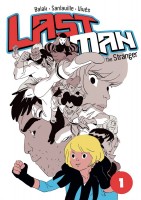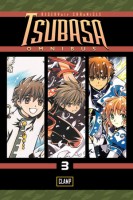My News and Reviews
I posted two reviews last week at Experiments in Manga that featured some of Kodansha Comics’ newest series: Masayuki Ishikawa’s Maria the Virgin Witch, Volume 1, released back in February, and Naoshi Arakawa’s Your Lie in April, Volume 1, which will be released later this month. The main reason I picked up Maria the Virgin Witch was because Ishikawa was the creator of Moyasimon. I really wasn’t expecting to like it as much as I did, but now I’m very interested in reading the rest of the series. Your Lie in April caught my attention because it’s a music manga. It has the potential to become rather melodramatic, but I did enjoy the first volume and plan on reading more.
Last week also saw the release of Gamon Sakurai’s Ajin: Demi-Human, Volume 4 from Vertical. I’m actually quoted on the back cover, a blurb taken from my review of the first volume. This is all very exciting, although my legacy will now probably be that of an ignorant reviewer who spouts nonsense about production values and the quality of paper. Although I thought it looked nice, it turns out Ajin is actually printed on one of the cheaper, thinner stocks used by Vertical. Anyway. Lesson learned! I also discovered that a much more flattering quote of mine from a quick take last year was used for the final volume of Tetsuya Tsutsui’s Prophecy, except that it was credited to Manga Bookshelf. So it goes!
Elsewhere online, Lori of Manga Xanadu has recently been putting together some interesting lists of manga. A few weeks ago she featured sewing and fashion manga and last week focused on manga which include books with great power. Organization of Anti-Social Geniuses posted the transcription of the panel with Abigail Blackman on manga editing, lettering, and Japanese nuance. from the Castle Point Anime Con. Geeks OUT! has an exclusive interview with Jiraiya (one of the creators featured in the Massive gay manga anthology) from his recent North American tour. And Zero Comprehension has a brief guide to the official releases of the Golgo 13 manga in English.
In licensing-ish news, Digital Manga has launched another Tezuka Kickstarter for Clockwork Apple and is making plans for its next yaoi Kickstarter. Unrelated, there’s also a Kickstarter project for an original-English boys’ love anthology that looks quite good—Boy, I Love You. Viz Media has licensed the Yo-Kai Watch manga series for its Perfect Square imprint. I don’t often mention anime licenses, but I was very excited to learn that Discotek Media will be releasing Library Wars and Dororo. Finally, Sparkler Monthly has added the reboot of Jennifer Doyle’s excellent webcomic Knights-Errant. (Also, the most recent Sparkler Podcast talks about josei manga and the differences between the Japanese manga industry and the North American comics industry, among other topics.)
Quick Takes
 Genshiken: Second Season, Volumes 4-6 by Shimoku Kio. For some reason, I don’t find the second season of Genshiken to be as engaging as the original manga series. I haven’t quite been able to identify why yet, though I suspect it may be because most of the newer characters haven’t seen much development in the recent volumes and the characters from the first “season” feel like they’re invading the new series. I think Genshiken works best for me with an ensemble cast. While there are still plenty of characters in the manga as well as regular plot tangents, lately the story has primarily focused on just a few. Admittedly, the two characters who are getting the most attention, namely Madarame and Hato, happen to be my favorites in the series. Hato in particular is marvelous. He’s going through some significant personal turmoil over his cross-dressing and love of boys’ love, which has a tremendous impact on the rest of the story and characters. And apparently just about everyone is in love with Madarame. But as interesting as the increasingly convoluted relationships in the series are, at this point what I really want is to know more about the other club members.
Genshiken: Second Season, Volumes 4-6 by Shimoku Kio. For some reason, I don’t find the second season of Genshiken to be as engaging as the original manga series. I haven’t quite been able to identify why yet, though I suspect it may be because most of the newer characters haven’t seen much development in the recent volumes and the characters from the first “season” feel like they’re invading the new series. I think Genshiken works best for me with an ensemble cast. While there are still plenty of characters in the manga as well as regular plot tangents, lately the story has primarily focused on just a few. Admittedly, the two characters who are getting the most attention, namely Madarame and Hato, happen to be my favorites in the series. Hato in particular is marvelous. He’s going through some significant personal turmoil over his cross-dressing and love of boys’ love, which has a tremendous impact on the rest of the story and characters. And apparently just about everyone is in love with Madarame. But as interesting as the increasingly convoluted relationships in the series are, at this point what I really want is to know more about the other club members.
 Last Man, Volume 1: The Stranger by Bastien Vivès, Michael Sanlaville, and Balak. Despite France being one of the world powerhouses of comics creation, relatively few French comics have been translated into English, especially when compared to the number of manga available. Last Man, which is in part inspired and heavily influenced by shōnen battle manga, has been very well received in France. And now, thanks to First Second, it’s available in English. (I believe Last Man may actually the first comic in translation that has been released by First Second.) Adrian is a young boy who has been training hard for his first fighting tournament, but when his teammate gets sick, it looks like he won’t be able to compete. Enter Richard, the titular stranger and a physically imposing man, who also needs a partner in order to compete. They make a peculiar pair: Adrian hasn’t quite mastered the magic and special techniques of his martial style, and Richard relies completely on his fists and strength. He also doesn’t appear to actually know the rules of the tournament, which poses a bit of a problem. So far, Last Man is delightfully engaging; I’m really looking forward to reading more of the series.
Last Man, Volume 1: The Stranger by Bastien Vivès, Michael Sanlaville, and Balak. Despite France being one of the world powerhouses of comics creation, relatively few French comics have been translated into English, especially when compared to the number of manga available. Last Man, which is in part inspired and heavily influenced by shōnen battle manga, has been very well received in France. And now, thanks to First Second, it’s available in English. (I believe Last Man may actually the first comic in translation that has been released by First Second.) Adrian is a young boy who has been training hard for his first fighting tournament, but when his teammate gets sick, it looks like he won’t be able to compete. Enter Richard, the titular stranger and a physically imposing man, who also needs a partner in order to compete. They make a peculiar pair: Adrian hasn’t quite mastered the magic and special techniques of his martial style, and Richard relies completely on his fists and strength. He also doesn’t appear to actually know the rules of the tournament, which poses a bit of a problem. So far, Last Man is delightfully engaging; I’m really looking forward to reading more of the series.
 Missing Road by Shushushu Sakurai. Before quietly disappearing, DramaQueen released two final manga by Sakurai, Junk! and Missing Road. What particularly caught my attention about these two manga was the fact that they were science fiction—a genre that I’ve rarely seen in translated boys’ love manga. Missing Road specifically was described as “an epic sci-fi adventure of love, loss, and redemption.” Sadly, although some of Sakurai’s ideas certainly had great potential and I did like the setting, Missing Road doesn’t quite live up to that promise. The manga would have been more successful from a narrative standpoint if Sakurai could have expanded the story over the course of multiple volumes. As it is, she tries to cover too much ground in a single installment and many of the manga’s elements feel underdeveloped or truncated as a result. There are important close and intimate relationships, but Missing Road isn’t really a love story and is instead more about brutal war and revenge. Most of the sex is of a violent nature and rape occurs on several different occasions. The English-language edition was actually censored (with permission from Sakurai) for fear of United States child pornography laws.
Missing Road by Shushushu Sakurai. Before quietly disappearing, DramaQueen released two final manga by Sakurai, Junk! and Missing Road. What particularly caught my attention about these two manga was the fact that they were science fiction—a genre that I’ve rarely seen in translated boys’ love manga. Missing Road specifically was described as “an epic sci-fi adventure of love, loss, and redemption.” Sadly, although some of Sakurai’s ideas certainly had great potential and I did like the setting, Missing Road doesn’t quite live up to that promise. The manga would have been more successful from a narrative standpoint if Sakurai could have expanded the story over the course of multiple volumes. As it is, she tries to cover too much ground in a single installment and many of the manga’s elements feel underdeveloped or truncated as a result. There are important close and intimate relationships, but Missing Road isn’t really a love story and is instead more about brutal war and revenge. Most of the sex is of a violent nature and rape occurs on several different occasions. The English-language edition was actually censored (with permission from Sakurai) for fear of United States child pornography laws.
 Tsubasa: Reservoir Chronicle, Omnibus 3 by CLAMP. With this omnibus, I have entered into territory that I previously didn’t have the opportunity to read before Tsubasa originally went out-of-print in English. At this point, I’m still enjoying the series. It’s not always the most emotionally compelling manga (although admittedly it can sometimes be heart-wrenching), but Tsubasa is definitely a solid adventure tale. The manga’s premise allows CLAMP to very creative and develop world after world, each one different from the ones preceding and following it and each with its own challenges and dangers to be faced. Nods to other CLAMP manga and characters are still prevalent, and I assume this will likely be true for the entire series. This particular omnibus prominently features RG Veda, which I haven’t actually read, so I probably don’t appreciate the references as much as someone who has. It looks like the alternate version of Seishirō from Tokyo Babylon and X will be an important antagonist in Tsubasa as well. The series Tsubasa most directly crosses over with is xxxHolic. This connection actually works very well for Tsubasa, but I find it somewhat distracting when reading xxxHolic.
Tsubasa: Reservoir Chronicle, Omnibus 3 by CLAMP. With this omnibus, I have entered into territory that I previously didn’t have the opportunity to read before Tsubasa originally went out-of-print in English. At this point, I’m still enjoying the series. It’s not always the most emotionally compelling manga (although admittedly it can sometimes be heart-wrenching), but Tsubasa is definitely a solid adventure tale. The manga’s premise allows CLAMP to very creative and develop world after world, each one different from the ones preceding and following it and each with its own challenges and dangers to be faced. Nods to other CLAMP manga and characters are still prevalent, and I assume this will likely be true for the entire series. This particular omnibus prominently features RG Veda, which I haven’t actually read, so I probably don’t appreciate the references as much as someone who has. It looks like the alternate version of Seishirō from Tokyo Babylon and X will be an important antagonist in Tsubasa as well. The series Tsubasa most directly crosses over with is xxxHolic. This connection actually works very well for Tsubasa, but I find it somewhat distracting when reading xxxHolic.
